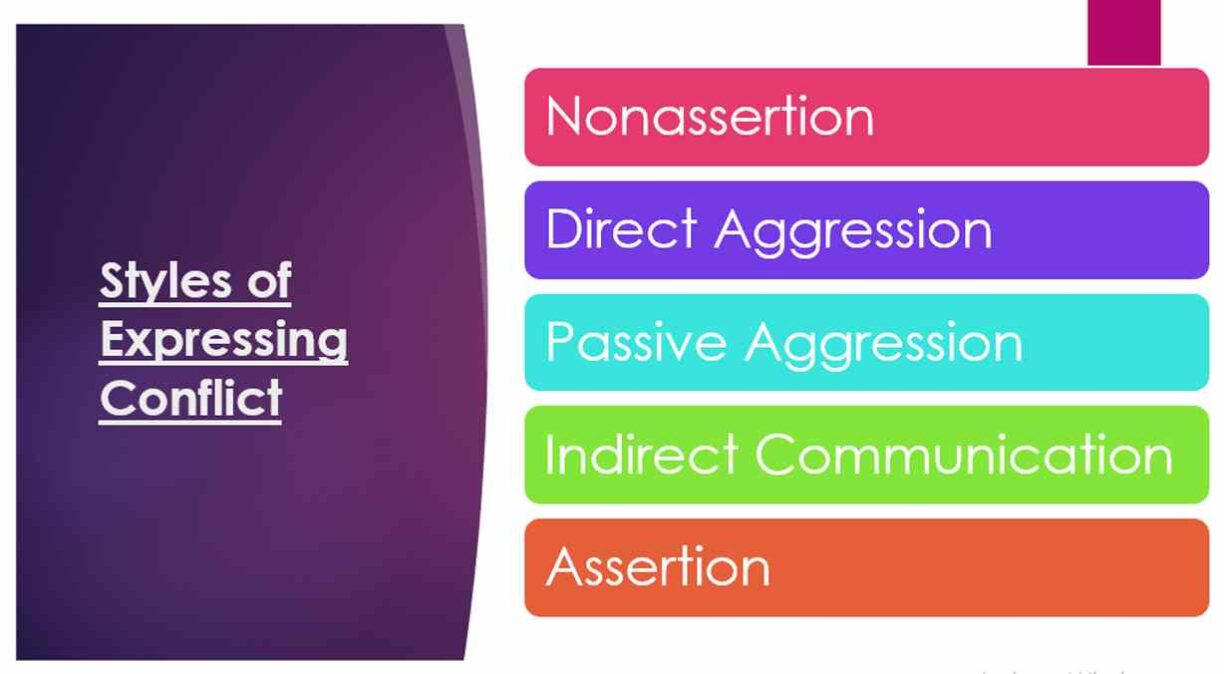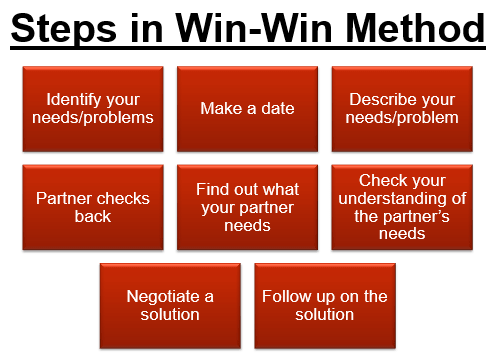Interpersonal Conflict
- It is impossible to eliminate conflict
- It is possible to manage it
- Essential for healthier and stronger relationships
The Nature of Conflict
- Expressed struggle
- Perceived incompatible goals
- Perceived scarce rewards
- Interdependence
Styles of Expressing Conflict
Different ways of handling conflict
- Nonassertion
- Direct Aggression
- Passive Aggression
- Indirect Communication
- Assertion
NONASSERTION
- When you can’t express your thoughts/feelings
- When you don’t want to express your thoughts/feelings
REASONS
- Lack of confidence
- Lack of awareness
- By choice
Forms of nonassertion:
- Avoidance (physical/conversational)
- Accommodation
- Sometimes avoidance and accommodation are sensible.
- Clear drawbacks too
Passive Aggression
- Also called ‘crazymaking’
- Pseudo accommodators
- Guilt makers
- Jokers
- Trivial tyrannizers
- Withholders
INDIRECT COMMUNICATION
- Conveying message in an indirect way
- Better than nonassertion
- Kinder than aggression
- Protects us from problems
- Saves face for the listeners
Risks of misunderstanding/no understanding
Assertion
- Ability to state your needs and feelings CLEARLY without using aggression
- Maintains self-respect of both parties
- Doesn’t always succeed because of other party’s different style
Methods of Conflict Resolution
Win-Lose
Power is the main force is such situations
- Physical power
- Authority
Sometimes win-lose is necessary
- When resources are little
- When other party insists on defeating you/self defense
- When other party is behaving in a CLEARLY wrong way
Lose-Lose
- Neither side is satisfied
- Common way of resolving conflicts
- Ego comes in
Compromise
- Both sacrifice part of their goals
- Not always an ideal option
Win-Win
- A solution that satisfies the needs of everyone
- Working together is important here
- Some compromises are a type of win-win
- But ideally both parties should get what they want (to call it a win-win)
Steps in Win-Win Method
Identify your problem and unmet needs
- Know that the problem is yours
- Identify your unmet needs
- feelings
Make a date
- Find the right time and place
- Not everyone is ready all the time to talk about conflicts
Describe your problems and needs
- Be specific
- Don’t use abstract terms
Partner checks back
- Very important to make sure if the partner understands your problem
Find out what your partner needs
- It is fair and just
- Unhappy partner will make it difficult for you to feel satisfied
- Ask the partner clearly
- Use listening skills
Check your understanding of partner’s needs
- Paraphrase
- Ask Questions
Negotiate a solution
- Think of different solutions
- Evaluate them
- Decide on best solution
Follow up on solution
- Discuss the situation calmly, see how you can contribute to improve things.
Interpersonal Communication
When two people communicate or engage in any way or to share functional messages as well is considered as interpersonal communication.
Does that mean that all kinds of communication between two people is INTERPERSONAL?
NO!
Quality is what distinguishes interpersonal communication
The opposite is impersonal communication
- We chat with shopkeepers
- We talk to fellow passengers on the bus
- We discuss weather or politics with classmates
For some scholars this is not interpersonal communication even if it involves only two people
Relational Skills
- Used in both workplace and non-workplace situations
- Recognition
- Sharing personal information
- Active listening
- Constructive criticism
Recognition
- Greetings
- Small Talk
Sharing personal information
- Telling someone private information about yourself
- Listening to others’ private information
Active listening
- The ability to recognize other person’s feelings while listening
- Engaging fully with the conversation
- Being there for the speaker in that moment
Constructive criticism
- Telling others what is bothering you and,
- making sincere and thoughtful suggestions for change
Guidelines for competence
- Develop a Range of Skills
- Adapt Communication Appropriately
- Engage in Dual Perspective
- Monitor your Communication
- Commit to Effective and Ethical Communication



